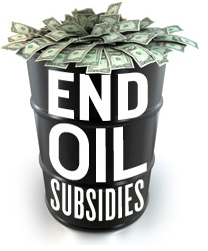
The Fossil fuel industry gets up to $62 billion in handouts every year.
Biden Infrastructure Plan Eliminates Billions in Fossil Fuel Subsidies
Tim De Chant / Ars Technica
(April 3, 2021) — Today, President Joe Biden will unveil a $2 trillion infrastructure plan that promises to overhaul the nation’s highways, airports, electrical grid, and more. It will be partly paid for by repealing subsidies for the fossil fuel industry.
Currently, the United States gives the $180 billion fossil fuel industry between $5 billion to $62 billion per year in direct subsidies, depending on the estimate. When accounting for indirect subsidies, including public health impacts and climate change, the handout could be as high as $649 billion. The Biden administration hasn’t specified which tax credits or subsidies it would eliminate, and certain subsidies probably will be subject to horse trading in Congress. That makes it difficult to get an accurate number at this point, but the number would certainly be in the range of billions of dollars.
If the Biden administration is successful, the US would be following through on a promise made at the 2009 G20 summit, which stated that signatories should “phase out and rationalize over the medium term inefficient fossil fuel subsidies.”
Handouts given to the fossil fuel industry run the gamut. Oil companies, for example, can take a tax deduction for a majority of their costs for drilling domestic wells. They also get to use special accounting methods that reduce their tax burden for both domestic and foreign sales. Oil producers are also considered manufacturers under certain parts of the tax code, which allows them to claim a tax break intended to prevent outsourcing of jobs. Coal companies similarly benefit from “clean coal” projects and accounting methods that increase the amount of depreciation they can claim when mining a reserve.
Though the end of subsidies would be a significant change in policy, the majority of Biden’s plan would be paid for by raising the corporate income tax from 21 percent to 28 percent.

Biden’s Big Plans
Biden’s proposal includes the usual planned investments in roads and bridges, but it also calls for $85 billion to revamp existing mass transit systems, which are in dire straits across the US as ridership has plummeted during the pandemic. Amtrak would receive $80 billion to address its backlog of repairs, and the plan will direct an unspecified amount of money to electrify the US Postal Service fleet and at least 20 percent of the nation’s school buses.
Infrastructure supporting electric vehicles would also get a boost under the plan—Biden is repeating his call for 500,000 EV chargers by 2030. The network would presumably be public, helping to address one of the major criticisms of an all-electric vehicle fleet: many renters do not have access to charging stations when their car is parked at home, and many owners of single-family homes may not have the funds to install one. A public network, especially one that includes tens of thousands of fast chargers, would go a long way toward addressing the problem. If the 500,000 chargers are installed at a constant rate, the network would comfortably exceed demand, as estimated in a 2019 report from the International Council on Clean Transportation, which suggested that the US would need just over 100,000 public chargers in 100 major metro areas.
In order to support the EV charger network, add capacity for all-electric housing, and address other shortcomings of the electrical grid, Biden’s plan proposes 20 gigawatts of high-voltage power lines and a ten-year extension of clean energy tax credits, including a provision for energy storage. It also calls for domestic supply chains to support battery manufacturing. Currently, the US lags behind Europe and Asia in that sector. Production at Tesla, for example, has been constrained by limited supplies. The provision supporting a domestic supply chain, including raw and intermediate battery materials, would be key to giving the sector a leg up. Previous efforts to create a battery manufacturing industry in the US failed in part due to a nonexistent domestic supply chain.
Biden’s plan is, of course, a proposal at this point. The administration will have to work with Congress, and the plan’s passage may require the use of the 51-vote budget reconciliation process since Republicans are unlikely to support it in meaningful numbers.
Posted in accordance with Title 17, Section 107, US Code, for noncommercial, educational purposes.